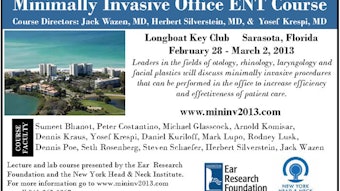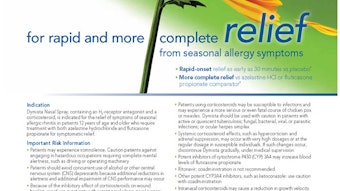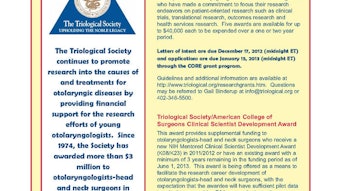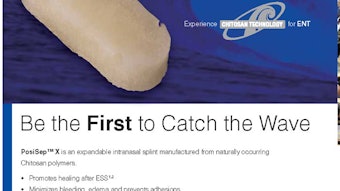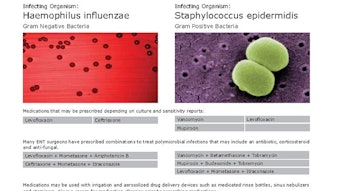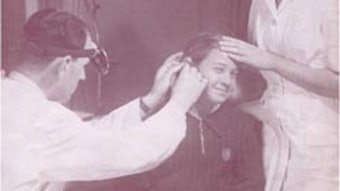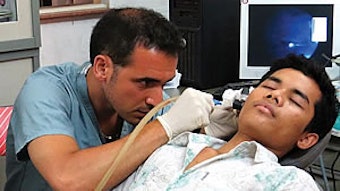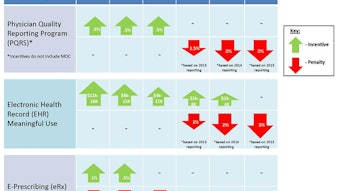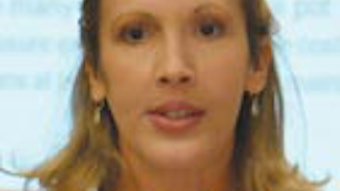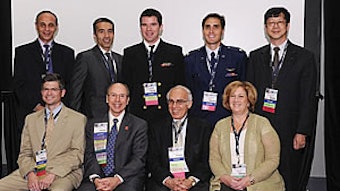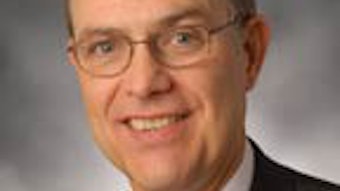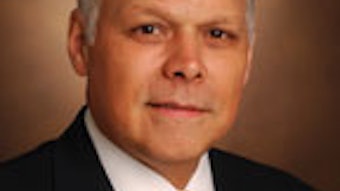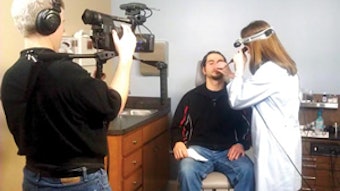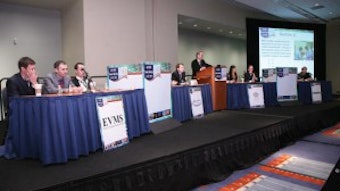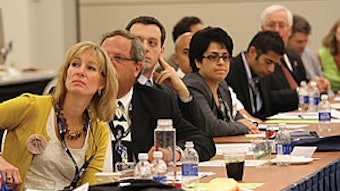Education: Meeting the Needs of All Our Learners
Sonya Malekzadeh, MD, Coordinator for Education Each December, the Board of Directors gathers at AAO-HNS headquarters for its annual strategic planning session. During the course of the two-and-a-half day meeting last year, the members reviewed and discussed the Academy’s priorities in order to ensure that our programs benefit our patients and meet our members’ needs in today’s environment. The education and knowledge outcomes from strategic planning were to: Consolidate and enhance the otolaryngology practice gap analysis and needs assessment process. Develop the next generation of otolaryngology education and knowledge resources through continuous assessment and redesign. Provide resources for board certification preparation, business of medicine, trauma, robotic surgery, surgical simulation, and resident education. Increase member awareness and engagement in the generation and usage of education and knowledge resources to improve patient care and outcomes. Practice Gap Analysis and Needs Assessment Extensive research demonstrates that traditional continuing medical education (CME)—based on a didactic model of lectures and reading, followed by testing—has little, if any, lasting influence on the practice patterns of physicians. As a result, the “new CME” emphasizes performance improvement rather than knowledge improvement. Therefore, our educational activities should be designed to change physicians’ competence, (having the ability to apply knowledge, skills, or judgment in practice) physicians’ performance (what a physician actually does in practice), and patient outcomes. Effective design of any education activity requires understanding of the physicians’ real-world practice needs or professional practice gaps. The Accreditation Council for Continuing Medical Education (ACCME) defines a professional practice gap as “the difference between actual and ideal performance and/or patient outcomes.” In other words, a professional practice gap is the difference between what is and what should be. During the next year, we will consolidate and enhance the otolaryngology practice gap analysis and needs assessment process by surveying key stakeholders and the general membership. Education Committee leaders will be asked to participate in a SWOT Analysis regarding current education strategies, education activity participants will be asked to assess the quality of these products, and the general membership will be involved in a comprehensive education survey and focus groups. Furthermore, the depth and scope of the professional practice gaps will be explored through review of current literature and identification of new diagnostic methods, current treatments, and innovative technology. Once professional practice gap data sources are identified, we will also incorporate quality, research, and health policy gap data into education needs assessment and planning. Subsequently, corresponding education activities will be designed and prioritized to bridge the gaps between physician practice needs and desired quality outcomes. Innovative Education and Knowledge Resources The Education Committees have provided leadership and expertise to the development of the next generation of otolaryngology education and knowledge resources through continuous assessment and redesign. This year’s focus has been on new products to support board exam preparation, resident education, and emerging topics including trauma, robotics, and simulation. New this year: The online learning platform has been redesigned to improve access to all online courses and lectures. The ENT Exam Video Series is now available on YouTube. The Comprehensive Otolaryngologic Curriculum, Learning through Interactive Approach (COCLIA), has new web navigation with enhanced discussion questions. The Trauma Committee published a Resident Trauma Manual e-book. A Simulation Fair took place at this year’s annual meeting sponsored by the Simulation Task Force. The Robotic Surgery Curriculum Group is developing a Robotic Surgery Policy Statement. Upgrades are being made to the Foundation’s education tracking system to enhance evaluation and participation data and to ensure continued accreditation compliance. Now that the ABO is in its third year of recertification, our membership has voiced concerns on the lack of exam preparation materials. With the Board’s approval, we began the process of rapidly expanding our resources to support Maintenance of Certification (MOC). AcademyQ: Otolaryngology Knowledge Assessment Tool™ debuted as a mobile application during the annual meeting. It presents hundreds of questions with answer explanations and reference material. Maintenance Manual for Lifelong Learning (MMLL), a comprehensive overview of core otolaryngology education content, is undergoing revision with an expected publication date of late 2013. Clinical Fundamental Instruction Courses were introduced to fulfill the ABO MOC requirements. Sessions on Anaphylaxis and Evidence-based medicine took place and were recorded for viewing and the remaining eight topics will take place and be recorded in 2013. MOC candidates will need to attend or view these sessions and pass a post-test. Increased Member Awareness and Engagement In an effort to ensure members are aware of the education opportunities available through the Foundation, emphasis has been placed on improving the quantity and quality of education and annual meeting communications. These initiatives include: Improvements to the annual meeting website with targeted annual meeting news launched for registrants. Monthly Bulletin presence for education products and resources with a full-issue education focus in December and Education Opportunities insert annually. Resources and new e-books continually added to online bookshelf. Enhanced AcademyU® Learning Station at the annual meeting. With these strategic goals in mind, we strive to remain the premier source of otolaryngology education and knowledge. In applying a systematic process that includes practice gap analysis, followed by development of innovative activities and ultimately meaningful evaluation of performance and patient outcomes, we will effectively link education with quality initiatives. Our team of dedicated leaders, volunteers, and staff are committed to achieving these goals for the ongoing strength and relevance of the organization. Stay tuned for new strategies and efforts in 2013 that support our continued commitment to excellence.
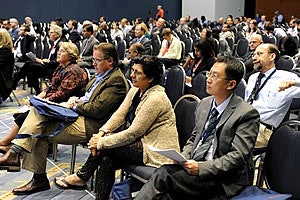 Educational sessions deliver updates to core knowledge, while new learning formats help physicians to implement practice changes.
Educational sessions deliver updates to core knowledge, while new learning formats help physicians to implement practice changes.Sonya Malekzadeh, MD, Coordinator for Education
Each December, the Board of Directors gathers at AAO-HNS headquarters for its annual strategic planning session. During the course of the two-and-a-half day meeting last year, the members reviewed and discussed the Academy’s priorities in order to ensure that our programs benefit our patients and meet our members’ needs in today’s environment.
The education and knowledge outcomes from strategic planning were to:
- Consolidate and enhance the otolaryngology practice gap analysis and needs assessment process.
- Develop the next generation of otolaryngology education and knowledge resources through continuous assessment and redesign.
- Provide resources for board certification preparation, business of medicine, trauma, robotic surgery, surgical simulation, and resident education.
- Increase member awareness and engagement in the generation and usage of education and knowledge resources to improve patient care and outcomes.
Practice Gap Analysis and Needs Assessment
Extensive research demonstrates that traditional continuing medical education (CME)—based on a didactic model of lectures and reading, followed by testing—has little, if any, lasting influence on the practice patterns of physicians. As a result, the “new CME” emphasizes performance improvement rather than knowledge improvement. Therefore, our educational activities should be designed to change physicians’ competence, (having the ability to apply knowledge, skills, or judgment in practice) physicians’ performance (what a physician actually does in practice), and patient outcomes.
Effective design of any education activity requires understanding of the physicians’ real-world practice needs or professional practice gaps. The Accreditation Council for Continuing Medical Education (ACCME) defines a professional practice gap as “the difference between actual and ideal performance and/or patient outcomes.” In other words, a professional practice gap is the difference between what is and what should be.
During the next year, we will consolidate and enhance the otolaryngology practice gap analysis and needs assessment process by surveying key stakeholders and the general membership. Education Committee leaders will be asked to participate in a SWOT Analysis regarding current education strategies, education activity participants will be asked to assess the quality of these products, and the general membership will be involved in a comprehensive education survey and focus groups.
Furthermore, the depth and scope of the professional practice gaps will be explored through review of current literature and identification of new diagnostic methods, current treatments, and innovative technology. Once professional practice gap data sources are identified, we will also incorporate quality, research, and health policy gap data into education needs assessment and planning. Subsequently, corresponding education activities will be designed and prioritized to bridge the gaps between physician practice needs and desired quality outcomes.
Innovative Education and Knowledge Resources
The Education Committees have provided leadership and expertise to the development of the next generation of otolaryngology education and knowledge resources through continuous assessment and redesign. This year’s focus has been on new products to support board exam preparation, resident education, and emerging topics including trauma, robotics, and simulation.
New this year:
- The online learning platform has been redesigned to improve access to all online courses and lectures.
- The ENT Exam Video Series is now available on YouTube.
- The Comprehensive Otolaryngologic Curriculum, Learning through Interactive Approach (COCLIA), has new web navigation with enhanced discussion questions.
- The Trauma Committee published a Resident Trauma Manual e-book.
- A Simulation Fair took place at this year’s annual meeting sponsored by the Simulation Task Force.
- The Robotic Surgery Curriculum Group is developing a Robotic Surgery Policy Statement.
- Upgrades are being made to the Foundation’s education tracking system to enhance evaluation and participation data and to ensure continued accreditation compliance.
Now that the ABO is in its third year of recertification, our membership has voiced concerns on the lack of exam preparation materials. With the Board’s approval, we began the process of rapidly expanding our resources to support Maintenance of Certification (MOC).
- AcademyQ: Otolaryngology Knowledge Assessment Tool™ debuted as a mobile application during the annual meeting. It presents hundreds of questions with answer explanations and reference material.
- Maintenance Manual for Lifelong Learning (MMLL), a comprehensive overview of core otolaryngology education content, is undergoing revision with an expected publication date of late 2013.
- Clinical Fundamental Instruction Courses were introduced to fulfill the ABO MOC requirements. Sessions on Anaphylaxis and Evidence-based medicine took place and were recorded for viewing and the remaining eight topics will take place and be recorded in 2013. MOC candidates will need to attend or view these sessions and pass a post-test.
Increased Member Awareness and Engagement
In an effort to ensure members are aware of the education opportunities available through the Foundation, emphasis has been placed on improving the quantity and quality of education and annual meeting communications.
These initiatives include:
- Improvements to the annual meeting website with targeted annual meeting news launched for registrants.
- Monthly Bulletin presence for education products and resources with a full-issue education focus in December and Education Opportunities insert annually.
- Resources and new e-books continually added to online bookshelf.
- Enhanced AcademyU® Learning Station at the annual meeting.
